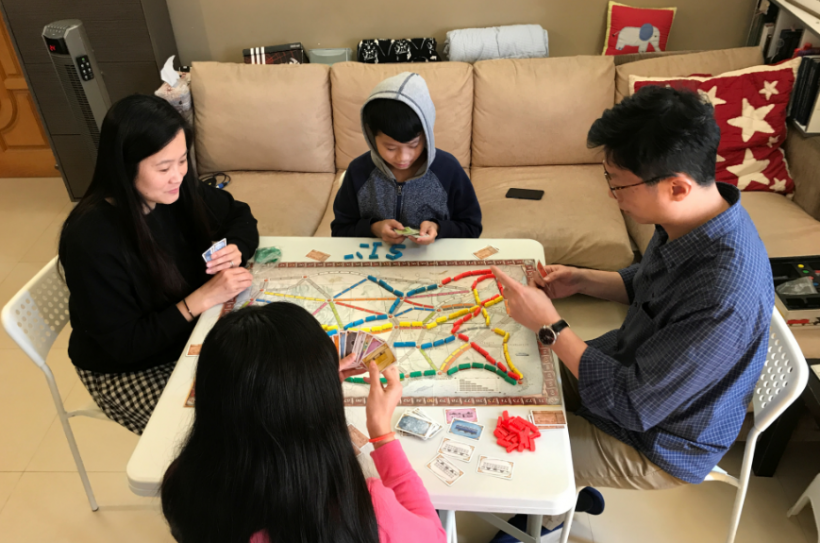
Derek Au, a 46-year-old manager at a non-profit organization, plays a board game with his wife and children at their home following an outbreak of the novel coronavirus, in Hong Kong, China February 24, 2020. Picture taken February 24, 2020. REUTERS/Aleksander Solum
Ever since the novel coronavirus has been identified in Wuhan, China where it all began it has caused unrest to many people. The people's fear grew more as hit many more countries around the globe, and just recently it was formally announced as a pandemic crisis.
People rely mostly on available technologies to get information. However, with so much information, precautions and warnings, whether it is from a reliable source like the CDC or dubiously-sourced post in some social media post, it sure can take a toll on your mental health.
Sometimes caution can become overreaction. The good news is, we can choose between ignoring the biggest story in the world right now, or going into full-on panic mode. Here are some tips for your brain that are the same as washing your hands and social distancing:
Limit your source of information
With tons of information available right now, it is very challenging to determine which one is accurate. Lynn Bufka, Associate Director for Research and Policy at the American Psychological Association suggested some steps in taking control of information intake.
First, find a few sources that you trust and stick with them. Choose one national or international source of information like the CDC, and another local source so you would know what's happening in your surroundings.
Secondly, limit the frequency of your updates. You don't need to hang on every update of the virus because things are rapidly changing. You may disable constant notifications from social media and news sites.
Third, you should know when to walk away. Bufka recommends detaching your phone or any electronic device that can give you information so you're not tempted to check it. Learn to be okay with feelings of uncertainty and knowing every little thing.
Lastly, practice social media discipline. This might be hard because it is not easy to limit the time on social media. But with the incessant commentary and the churn of information from your friends is more frequent in your newsfeed than actual updates from health organizations or the government. Bufka recommends uninstalling social media applications to limit useless scrolling through the social media feed.
Know your Fears
To face your fears, you must first identify them. Know what truly scares you and consider your risk of contracting the disease. You might also fear that someone you love may fall ill and that you might also catch it but in all likelihood, there is still hope.
Humans tend to overestimate the likelihood of something happening, and underestimating our capacity to deal with it. When we deal with much practical fear, like what if you are put into quarantine and access to childcare or groceries are not likely, we tend to forget that our capabilities to manage hardships are greater than what we think.
You can start by thinking about a plan and consider options like telework. Having support and savings will help keep fear in scale.
Think of Other People
Since action can put anxiety at rest, you also might want to consider helping other people in this season. They could be more affected by the pandemic than you. Their livelihoods such as those service workers in the medical field, restaurant or entertainment industries may be paralyzed or put their lives in disproportionate danger.
After all, the precautions put in place aren't just for you but for all people. They are intended to keep communities and vulnerable individuals safe. Doing so can empower you to see the effects of the disease rather than focusing on your theoretical fears.
Seek Support and Pay Attention to Your Basic Needs
According to Bufka, running to someone for support with the same level of fear you have will not help you. You should talk to someone who is handling it differently, check your anxiety and give some advice.
Don't overthink the coronavirus because you might forget the essential and healthy practices that affect your well-being daily. Get adequate sleep, keep up with proper nutrition, go outside and engage in regular exercise. Practicing mindfulness technique can also aid you in habits and awareness that keep your mind from wandering into the irrational unknown.
Don't Chastise Yourself for Worrying
Finally, do not be guilty of worrying because you are allowed to do that. Likewise in talking to children, adults must acknowledge their fear and let them know that their feelings are valid. Give them the same compassion you give yourself.
The key is understanding and contextualizing your fear so you could live a mentally healthy life.











!['Cosmic Glitch' in Einstein's Theory of General Relativity Could Be Explained in This New Scientific Tweak [Study]](https://1721181113.rsc.cdn77.org/data/thumbs/full/53435/258/146/50/40/cosmic-glitch-in-einsteins-theory-of-general-relativity-could-be-explained-in-this-new-scientific-tweak-study.jpeg)


